Introduction
This is a review of the DCS A-10C Warthog updated to DCS World 1.2.0, by Eagle Dynamics.
Eagle Dynamics is a Russian developer that has a long history in developing flight simulation titles. Their past work includes SU-27 Flanker, Lock-on Modern Air Combat, and it's add-ons Flaming Cliffs 2.
Eagle Dynamics newest franchise is the Digital Combat Series. The goal with DCS is to simulate one aircraft completely with high realism. Current DCS titles are DCS: KA-50 Black Shark 2, A-10C
(Reviewed here), P-51D, Combined Arms, and lastly DCS World. DCS World will be covered later in this review.
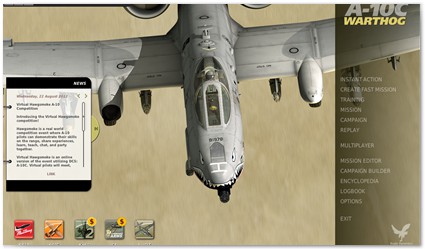
DCS main menu |
The main menu is simple, clean and easy to navigate. From the menu you can go into the different game modes, the two editors, replays, multilayer, your logbook, encyclopedia, and lastly options.
Your logbook will keep track of your flight hours, kills, deaths, score, and a few other stats. Your logbook will also keep track of in-game rank and awards. Both are awarded based on your score.
Do you want to know what a BMP-3 looks like? Well check out the encyclopedia. You can use it to view general information, and a picture of what the unit actually looks like in game.
DCS A-10 comes with an amazing set of training missions. They range in basic familiarisation with the A-10 to how to fly the A-10 and how to fight with the A-10.
The training missions put you in the cockpit with a virtual instructor and it follows a pattern of 'I do then You do', with voiced and written instructions. During the 'I do' part where the instructor is showing you how to do something you are required carry out actions such as pressing a button. That button will be highlighted making it easy to locate. This method is a great way to learn where everything is quickly and helps with the learning curve of the game.
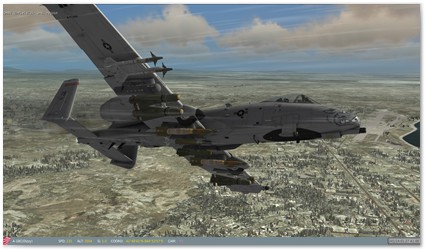
Weather conditions can include snowfall in the winter |
The missions and the campaign itself are very well written and designed except for one small quibble. The Georgian Hammer campaign places your aircraft on the runway ready for take off. This puts you into the action fairly quickly but takes away from the fun going from cold and dark to mission ready. It should be said while the game ships with one campaign there are a few available for download at the DCS website under "User Files".
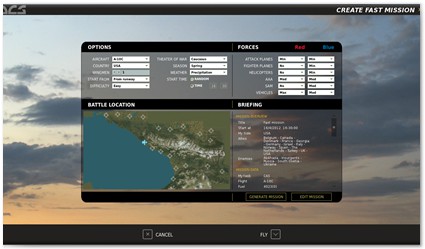 Advanced Options in the Create Fast Mission Screen |
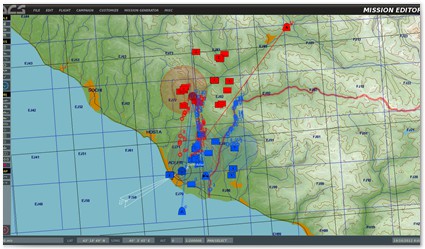 Mission Editor - Not |
There are two editors that come with DCS A-10. A mission editor and a campaign builder. The mission editor has a fairly steep learning curve. That being said it is very easy to make a simple mission where you go out and blow up some stuff, the layout of the editor is simple and intuitive.
Graphics
DCS A-10C is a beautiful game. It comes with all the options that one would expect to find in a modern DirectX9 game. It also includes extras like self shading cockpits, reflective mirrors, heat wave, and selectable HDR colours.
The A-10C is beautifully rendered; any rivet counter would be happy with it. All the animations we would expect plus a few extras, like movable seat, trim tabs that noticeably move, maintenance hatches that open when repairs are being done, and GAU-8 cooling cycles.
The cockpit of the A-10 is sharp and crisp. All information is clear and easily readable, including switch labels, dials, and displays. Damage textures look realistic and correspond to proper system failures. If you loose the right engine expect to see that engine shot up and missing parts. Gun not working? Expect to see bullet holes in the nose section. Got a fuel leak, you should see a hole in your wing. Look down from above and you can see the ground through your wing.
Weapon systems have also been modelled in great detail. Most of the writing on the bombs and missiles will be legible.
The targeting pod cameras move to follow the target on the ground as you move, the weapon animations are also good. If you shoot a rocket you will see it spin as it travels away from your aircraft. The CBU-97 cluster bomb will break into it's 10 bomb-let dispensers and float down on parachutes until the rockets fire and the bomb-lets spin out and rain destruction.
Explosions look like a mix of realism and a hint of Hollywood. The effect works nicely to give some great eye candy without taking away from the realism of the game.
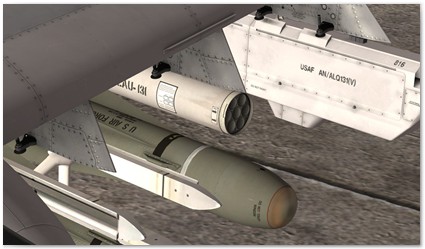 Writing on the bombs is legible |
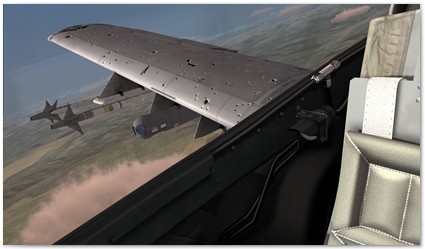 It's only a flesh wound |
The world outside the A-10 is also nicely done. Trees, building, and bushes are scalable. Towns look realistic with buildings, streets, and trees. The clouds are also nicely done, and provide some nice visuals without hitting the frame rates too hard. The world also comes with all four seasons.
Finally sources of light are just that, and will illuminate the 3D world around them. This includes other objects. Your landing lights will illuminate other aircraft, buildings, trees, and so on. Flares and fires will illuminate the ground around them. It is truly a beautiful world.
Sounds
Sounds are hard to explain, but are essential to the immersion of the sim. And DCS does this right.
Every button and switch in the cockpit clicks, the canopy motors make a whiny sound when it opens and closes, the seat moving makes a different whiny electric motor sound. The GE TF34 high bypass turbo fans sound much like they do in real life (or YouTube videos of a real A-10).
The weapons make satisfying launch or firing sounds, and the explosions make a nice boom. Distance from the camera to the sound is implemented, so if the camera is far enough away you might see the explosion before hearing it. Lastly environmental sounds are included, like rumbling of thunder, and rain hitting the canopy.
Flying and Fighting the A-10C
DCS A-10C Warthog comes with two different game modes. Game and Simulation. Game mode will give you an experience more like the Ace Combat series. Simulation is a full blown study sim, with a very steep learning curve.
Expect to spend a lot of time in the virtual morgue and hospital, because DCS will punish you hard, and it seems to be proud of that fact. But not to worry the manual will be a great help in learning the systems and weapons of the A-10. This section of the review will be only about the simulation portion of DCS A-10.
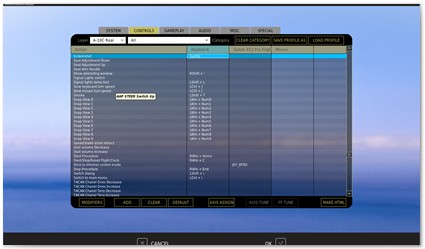
Control screen |
Every button and switch in the cockpit moves, and all the systems in the A-10 are modelled except the IFF, Secure Voice, the Target Identification Set, Laser (TISL), and a few of the environmental systems. The IFF and Secure Voice are still classified systems, the TISL functions are actually provided by the targeting pod in the A-10C and the panel is more a left over from the A-10A and now provide backup, and the environmental systems aren’t needed because your flying a virtual air plane and who cares if the cockpit is -30C?
With a slew of alphabet systems like SAS, EAC, and MRFCS, the A-10 flies and feels good. Despite the the A-10's size and weight, it's still agile while being a very stable weapons platform.
All primary flight information is displayed on the HUD, with the usual backup. The HUD has five master modes, four are cycled by a press of the mode button, NAV, GUNS, CCIP, CCRP. The fifth is an Air to Air mode and can only be reached by holding the master mode button. The HUD is uncluttered and easy to use, and anybody who has used a HUD before in any sim will feel at home with the A-10's.
Engine management is super easy in the A-10. Turning them on is a matter of moving the throttles out of the off detent, and the auto-start sequence is started. Turning off the engines involves moving the throttles into the off detent. All the engine monitoring gauges are found in the lower right of the main panel and are steam gauges with colour coded marks around the edges. They are quick and easy to read, keep the needles in the green and everything is happy, and the engines will keep on purring.
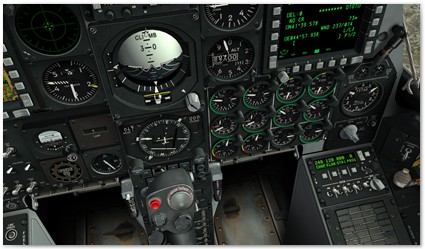
Engine gauges |
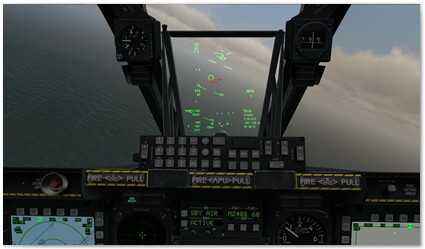 Labels can help you find targets |
While this all sounds cluttered and confusing it's not really, and this page will be one of your best friends. So where does the TAD get all the navigation information? Well it comes from the EGI/CDU. The EGI is a GPS/INS based navigation system and the CDU is it's user interface. Both are modelled fully in game.
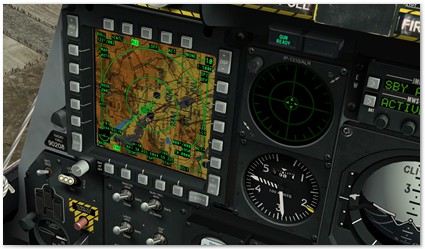 TAD displays nice colours |
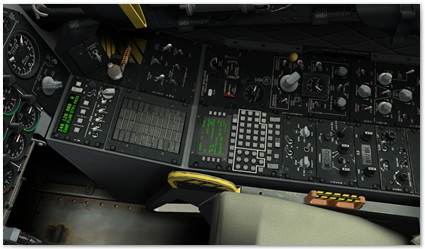 EGI and CDU |
During missions, EGI/CDU interactions are usually turning it on, loading up mission data from a cartridge, starting the alignment, and entering coordinates for a target given by the JTAC. Backing up the EGI/CDU is the HARS. The HARS is a system of gyros that will provide basic information to fly the A-10 if the EGI is lost. It will display this information on the HUD, DG, and Attitude indicator. Lastly you can also navigate using ILS, and TACAN.
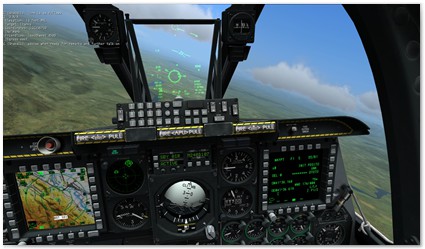 JTAC 9-Line |
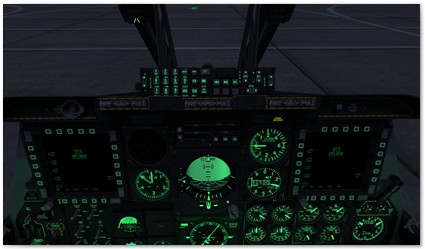 DTS Upload page and Night lighting |
The weapons master arm simulates three conditions, safe, arm and train. The gun and laser also have three selections, for the Gun there is safe, Gun/PAC arm, and lastly GUNARM. The difference is in Gun/PAC arm, not only is the gun armed but the PAC system is also turned on. GUNARM arms the gun only. The PAC is a system that will stabilize your aircraft while the first stage of the gun trigger is held down. The laser has safe, arm and also a training mode.
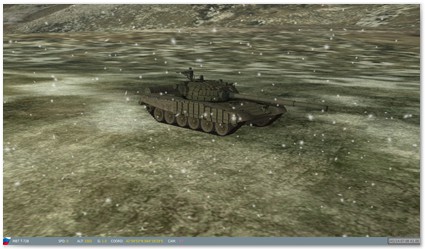 Russian tanks look good |
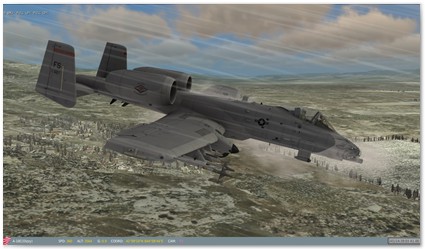 Smoke coming off the cannon |
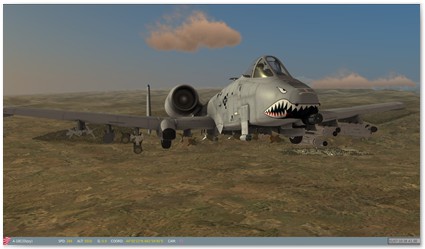
Looking mean |
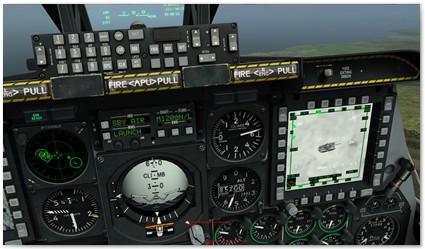
Tank being lased |
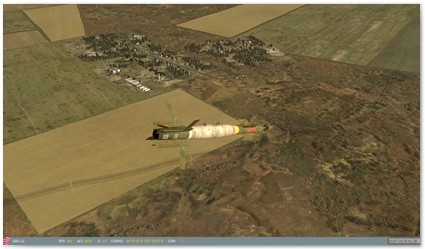
GBU12 in flight | 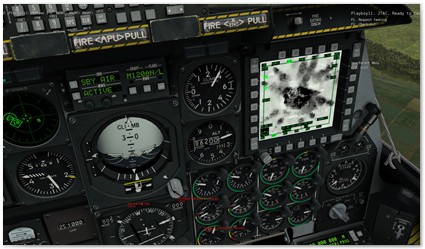 Tank going boom |
As stated the targeting pod can search for friendly unit's targeting lasers, and it does work if set up properly. The usual state for the target pod is searching and lasing targets. Of course with a targeting pod, the A-10 can carry a variety of smart bombs. Nothing is more satisfying then watching a tank explode in the target pod view.
Lastly the maverick systems are amazing. While the IR view mode is simplified like the targeting pod, it works very well and can easily find targets. The truly amazing part is the options on how to power up the mavericks. Not only can you just turn them on in the DSMS missile page, but you can set them to power up upon crossing a way point, or if you would like more control, you can set them to power up at a predetermined point in space.
AI
The AI in DSC A-10C has been improved from the AI in Black Shark. Your wing-men will engage targets if you let them, making it feel like you are not alone on the missions. The other AI aircraft will also carry out their missions once again giving you the feeling you are not alone. Ground units will engage each other, and will move if getting shelled, or bombed. This goes for enemy units too, if you blow up a tank don’t expect the tank group to sit still and let you bomb them.
Communications are believable, realistic and bring an added immersion. However, they can lag a bit, giving you an impression that you are being ignored and are talking to yourself.
The highlight of the AI is the virtual JTAC interactions. JTAC stands for Joint Terminal Attack Controller. In simple terms JTAC is the US Armed Forces standard forward air controller. The virtual JTAC follows real world procedures from check-in, to the 9-line, to the attack, aftermath, and finally the check-out.
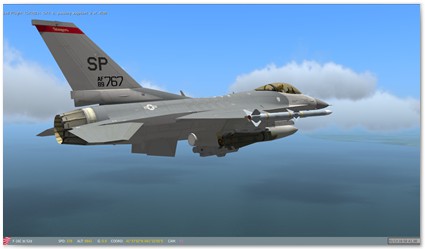 AI F-16 |
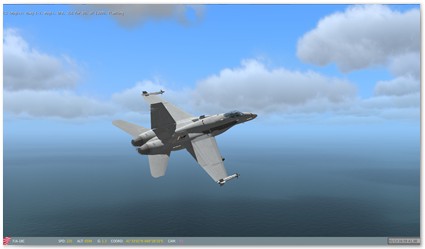 AI F-18 |
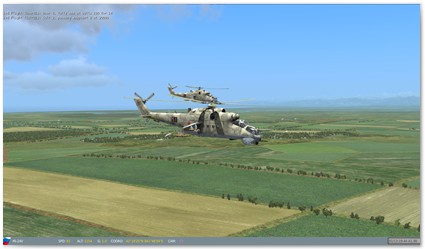 AI in formation, later they kill me |
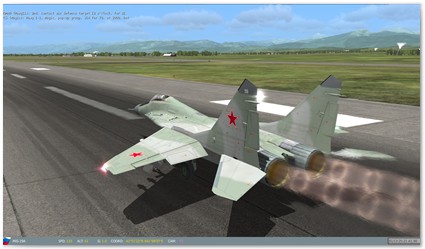 AI MIG 29 |
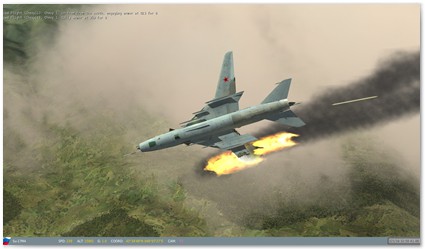
|
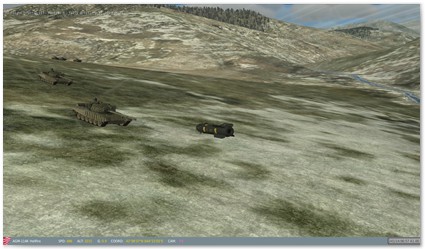
|
Multiplayer
Sadly I didn't get a chance to fly multiplayer for 1.2.0. However I did fly the previous version 1.1.1.1. in multiplayer.
Multiplayer is fun. Simple as that, you have all the same systems as you do in single player, but your with your friends. The best part is that A-10C is compatible with Black Shark 2. So if you have A-10 and your friend has BS2 you can still fly together, all it needs is a mission with a A-10 as a client, and a KA-50 as a client.
Now with World, you can play multiplayer with A-10C, BS2, P-51, and lastly Combined Arms. The only lacking part of multiplayer is there is no built in voice communication system, so you need to rely on an outside program like Vent or Team Speak. However it does support text messaging in game so you can still talk to your friends.
DCS World
As stated I would say a few words about DSC World. Simply put, DCS world is a way to integrate Black Shark 2, A-10C into one install.
Previously if you owned both titles you had two installs. With World you have one main install, that has all the common files for both titles, and two modules that contain all the files for BS2 and A-10C. This is now the future of the DCS series, as two new products have started beta with world, Combined Arms, and the P-51 Mustang.
World is also in beta so I didn't comment on some issues it had with running A-10C. The issues are small and easily fixed with a few hot-fixes, found on the DCS forums. While writing this review DCS World and DCS A-10C did receive an update and are now 1.2.1. Finally DCS world is free, and comes with a SU-25 to fly.
Conclusion
DCS A-10C Warthog, is a very impressive simulation. I enjoyed every minute of my time playing. When I got blown out of the sky, or shot down by a tank (yes that happens) it made me want to do better, to complete the mission and come back in one piece.
Yes, the learning curve is steep, and it wont be everybody's cup of tea. But if you can learn to fly a 737, 767, Concorde, MD-11, or a 747, you can learn to fly and fight an A-10 and will be at home in it's cockpit.
 |
![]()
Verdict
![]()
I would recommend this to anybody who likes combat sims, or study sims. Even those who would like to dip their toes into the genre will find something for them with the scalable difficulty.
| • External Model: • Internal Model: • Sounds: • Flight Characteristics: • Flight Dynamics: • Documentation: • Value for Money: |
10.0/10 10.0/10 10.0/10 9.0/10 9.0/10 9.5/10 9.0/10 |
The DCS A-10 achieves a Mutley's Hangar score of 9.5/10
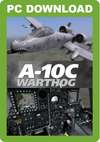 |
System Requirements
|
